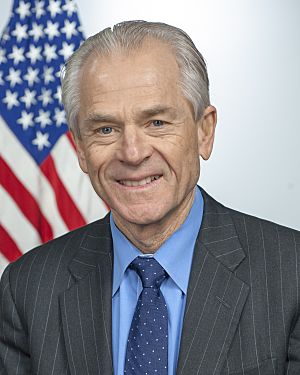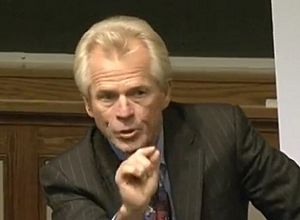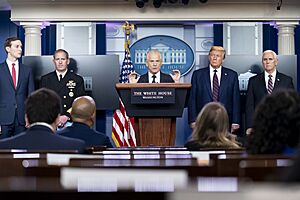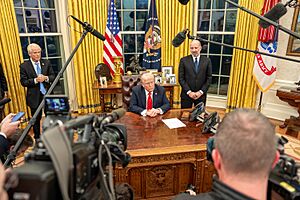Peter Navarro facts for kids
Quick facts for kids
Peter Navarro
|
|
|---|---|

Official portrait, 2017
|
|
| Senior Counselor to the President for Trade and Manufacturing | |
| Assumed office January 20, 2025 |
|
| President | Donald Trump |
| Preceded by | Steve Ricchetti |
| Director of the Office of Trade and Manufacturing Policy | |
| In office April 29, 2017 – January 20, 2021 |
|
| President | Donald Trump |
| Preceded by | Position established |
| Succeeded by | Position abolished |
| Director of the National Trade Council | |
| In office January 20, 2017 – April 29, 2017 |
|
| President | Donald Trump |
| Preceded by | Position established |
| Succeeded by | Position abolished |
| Personal details | |
| Born |
Peter Kent Navarro
July 15, 1949 Cambridge, Massachusetts, U.S. |
| Political party | Democratic (before 1986, 1994–2018) Independent (1986–1989, 1991–1994) Republican (1989–1991, 2018–present) |
| Spouse |
Leslie Lebon
(m. 2001; div. 2020) |
| Education | Tufts University (BA) Harvard University (MPA, PhD) |
| Scientific career | |
| Fields | Economics |
| Thesis | A theoretical and empirical investigation of corporate charity motives (1986) |
| Doctoral advisor | Richard E. Caves |
| Doctoral students | Puma Shen |
Peter Kent Navarro (born July 15, 1949) is an American economist. He is currently a top advisor to U.S. president Donald Trump on trade and manufacturing. He started this role in January 2025.
Before this, he worked in Trump's first administration. He was the director of the White House National Trade Council. Later, he led the Office of Trade and Manufacturing Policy.
Navarro is a professor emeritus of economics at the University of California, Irvine. He has run for public office several times in San Diego, California. As an advisor, Navarro has supported policies that protect American industries. He is known for his strong views on trade with China. He was a key person in the China–United States trade war.
During his last year in Trump's first term, Navarro helped with the government's response to the COVID-19 pandemic. He also became the national coordinator for the Defense Production Act. He warned about the virus privately but sometimes downplayed risks in public.
Navarro was involved in efforts to question the results of the 2020 presidential election. He was later asked by Congress to provide information. When he refused, he was found to be in contempt of Congress. In 2023, he was found guilty and in 2024, he was sentenced to four months in jail. He was the first former White House official to be jailed for this.
Navarro's ideas about trade are different from what most economists believe. He strongly believes in reducing America's trade deficits. He sees China as a big challenge to the United States. He has written books like The Coming China Wars (2006) and Death by China (2011). In some of his books, he quoted a made-up economist named "Ron Vara."
Contents
Early Life and School
Navarro was born on July 15, 1949, in Cambridge, Massachusetts. His family has Spanish roots. His father, Albert "Al" Navarro, was a musician. He played the saxophone and clarinet.
After his parents divorced, he lived with his mother in Florida and later Maryland. He went to Bethesda-Chevy Chase High School.
Navarro went to Tufts University on a scholarship. He earned a Bachelor of Arts degree in 1972. From 1973 to 1976, he served in the Peace Corps in Thailand. He also traveled to other Asian countries.
He later earned a Master of Public Administration from Harvard University in 1979. In 1986, he received his PhD in economics from Harvard. His main research was about why companies donate to charity.
Career Highlights
Teaching and Research
From 1981 to 1985, Navarro was a researcher at Harvard. He studied energy and environmental policies. He taught at the University of California, San Diego and the University of San Diego.
In 1989, he joined the University of California, Irvine. He became a professor of economics and public policy. He taught there for over 20 years and is now a professor emeritus. He has won awards for his teaching.
In 1984, Navarro wrote a book called The Policy Game. It talked about how special interest groups might harm America's growth. He also researched wind energy.
Running for Office
While teaching, Navarro ran for public office five times in San Diego, California. He focused on limiting new housing and immigration. In 1992, he ran for mayor but did not win.
He also ran for San Diego city council in 1993. In 1994, he ran for the San Diego County board of supervisors. In 1996, he ran for Congress as a Democrat. He lost these elections as well.
Books About China
Navarro has written many books on economics. He started focusing on China in the mid-2000s. He felt that China's trade practices were causing Americans to lose jobs.
His first book on this topic was The Coming China Wars (2006). It looked at China as a growing world power. The book discussed how China's trade created conflicts with other countries. These conflicts were about energy, resources, and intellectual property.

In Death by China (2011), Navarro and Greg Autry argued that China uses unfair trade methods. They said China's actions made it hard for American companies to compete. Navarro also made a documentary film based on this book in 2012.
Navarro used a fictional economist named "Ron Vara" in some of his books. "Ron Vara" is an anagram of his own name. Navarro later said he made up the character to express some of his views.
Advisor to Donald Trump
Navarro became an economic policy advisor for Donald Trump's 2016 presidential campaign. Trump's son-in-law, Jared Kushner, found Navarro's book Death by China online. Kushner liked the book's ideas and suggested Navarro join the campaign.
Navarro worked on economic plans that focused on trade with China. He and Wilbur Ross wrote an economic plan for the campaign. Navarro supported policies that would protect American industries.
First Trump Administration (2017–2021)
White House Trade Role
In December 2016, President-elect Trump chose Navarro to lead the new White House National Trade Council. Navarro was a strong advisor on trade. He encouraged Trump to use policies that protected American businesses. He was very important in the China–United States trade war.
In April 2017, the National Trade Council became part of the Office of Trade and Manufacturing Policy. Navarro was named its Director. He believed his role was to support Trump's ideas on trade.
Views on China
Navarro was part of a group that wanted Trump to take a tough stance against China. He believed in bringing manufacturing jobs back to the U.S. He pushed the Trump administration to start the trade war with China in 2018.
He often disagreed with other officials who wanted a more moderate approach to trade with China. He claimed that China used unfair trade practices. These included pollution, poor labor standards, and stealing ideas.
In January 2021, the Chinese government placed restrictions on Navarro. They also restricted 27 other Trump officials. This meant they could not enter China or do business there.
Response to the Pandemic
During 2020, Navarro helped with the government's response to the COVID-19 pandemic. In January 2020, he wrote a memo warning about the virus. He said it could become a serious pandemic. He also suggested limiting travel from China.
In March 2020, Trump asked Navarro to help coordinate the Defense Production Act. This act helps the government get needed supplies during emergencies. Navarro worked to increase the production of medical supplies in the U.S. He wanted America to rely less on foreign countries for important medicines.
Navarro also discussed treatments for the virus. He sometimes disagreed with public health experts like Anthony Fauci. Navarro often called the virus the "China virus."
Election Concerns
In late 2020, Navarro's office began looking into claims of election problems. In December 2020, he published a report about election fraud. This report repeated ideas that had already been shown to be incorrect.
Navarro worked with others to try and delay the official counting of election votes on January 6, 2021. He later wrote a book, In Trump Time, describing these efforts.
After the First Administration (2021–2025)
Legal Issues with Congress
In February 2022, a special committee in Congress asked Navarro for documents and to testify. This committee was investigating the events of January 6, 2021. Navarro refused to provide the information. He said that President Trump had told him not to.
In June 2022, a grand jury decided that Navarro should face charges for not cooperating with Congress. He was arrested at an airport. A judge later said his arrest seemed "unreasonably harsh."
In January 2023, a judge said Navarro could not use Trump's instructions as a reason to avoid cooperating. The judge noted that Navarro did not have proof that Trump had formally ordered him not to.
In September 2023, a jury found Navarro guilty on two counts of not cooperating with Congress. He was the second former Trump aide to be found guilty of this. In January 2024, he was sentenced to four months in jail and fined. He was ordered to report to a prison in Miami, Florida.
Navarro tried to appeal this decision to the Supreme Court. However, Chief Justice John Roberts rejected his appeal. Navarro was in prison from March 19 to July 17, 2024. After his release, he spoke at the 2024 Republican National Convention.
Presidential Records
In August 2022, the Justice Department sued Navarro. They wanted him to return official emails he had sent from a personal account. These emails were considered government records. Navarro had refused to return them.
In March 2023, a judge ordered Navarro to turn over the records. The judge said he had a clear duty to do so under the Presidential Records Act. Navarro appealed, but the appeals court also said he must return the records.
Second Trump Administration (2025–Present)
On December 4, 2024, President-elect Donald Trump announced that Navarro would return as his senior counselor for trade and manufacturing. He started this job on January 20, 2025. He is one of the few officials from Trump's first term to come back for his second.
In January 2025, Navarro spoke about the NAFTA trade deal. He called it a "catastrophe." He also linked it to problems with illegal immigration. In February 2025, Navarro was a key official in discussions about new tariffs on Canada, China, and Mexico.
He pushed for Trump to adopt a "reciprocal tariff" policy. This policy would set tariffs based on trade deficits. Navarro claimed these tariffs would bring in a lot of money. However, some experts disagreed with his financial predictions.
In April 2025, Navarro was criticized by Elon Musk. Musk questioned Navarro's qualifications. Navarro responded by criticizing Musk's business. Later that month, Navarro suggested pressuring countries like Cambodia, Mexico, and Vietnam to reduce trade with China. In May, he accused the United Kingdom of being too close to China.
Navarro is a strong critic of trade with China. He believes China uses unfair practices. He wants to reduce America's trade deficits. He also supports policies that protect American industries. He wants to increase manufacturing in the U.S. and bring supply chains back home.
Most economists do not agree with Navarro's views on trade. They see his ideas as outside the main economic thinking. He has been called "one of the most versatile and productive American economists" by some, but others disagree with his trade ideas.
Political Stance
Navarro's political views have changed over time. He was a registered Democrat while studying at Harvard. He later became a Republican, then an Independent, and then a Democrat again. He supported Hillary Clinton in 2008 and Barack Obama's environmental policies.
During the 2016 election, he called himself a "Reagan Democrat" and a "Trump Democrat." By 2018, he had re-registered as a Republican.
Trade Deficits
Navarro believes that trade deficits are bad for a country. A trade deficit means a country imports more than it exports. He thinks reducing these deficits will help the economy grow.
However, many trade experts and economists disagree with this view. They say that trade deficits are not always bad. They believe Navarro's ideas on trade deficits are based on misunderstandings.
Personal Life
In 2001, Navarro married Leslie Lebon, an architect. They lived in Laguna Beach, California. They divorced in December 2020. In July 2024, Navarro announced he was engaged to a woman named Bonnie.



